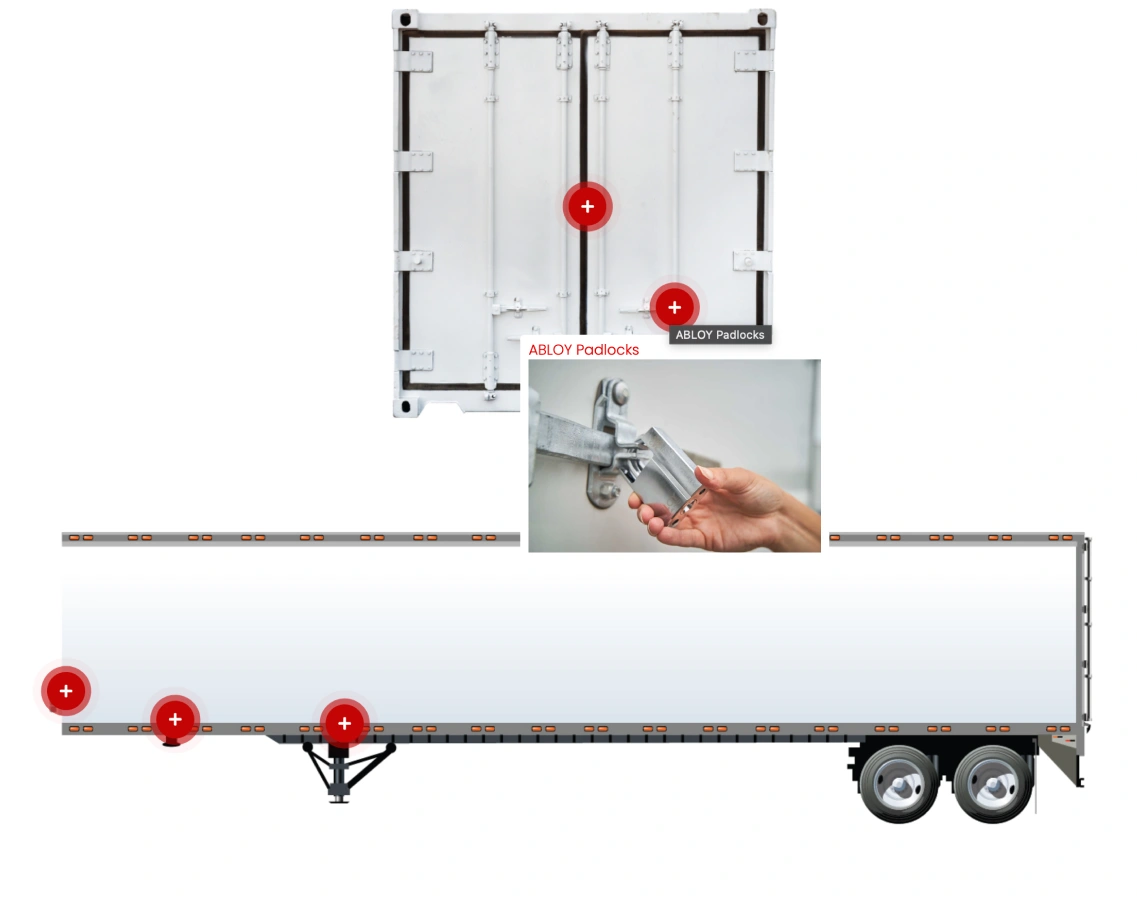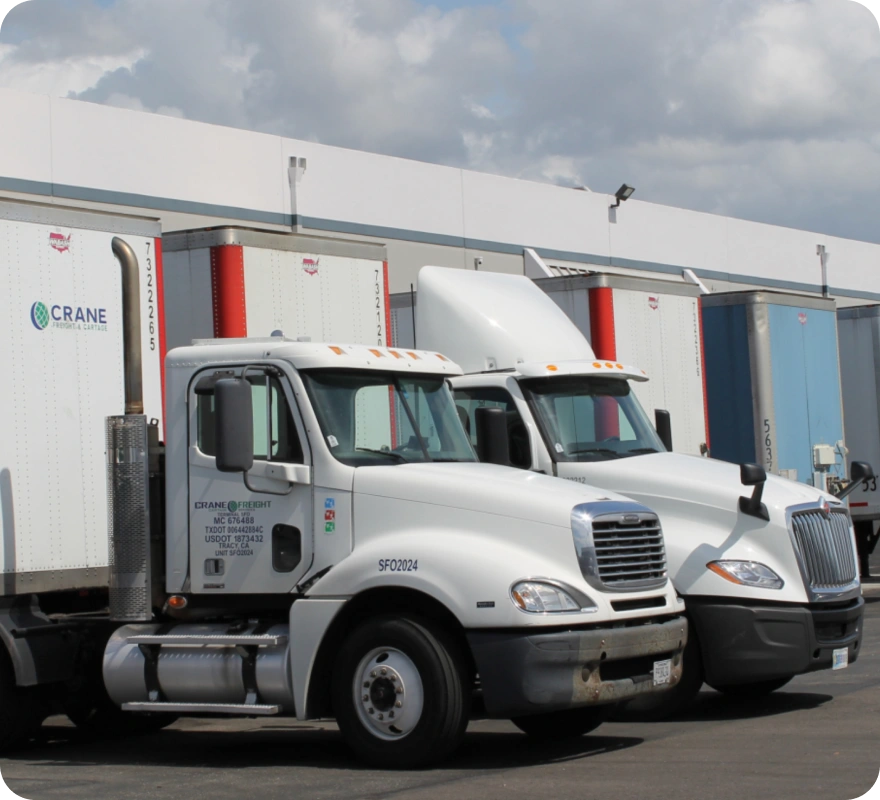Trailer theft continues to be one of the fastest-growing security challenges facing fleet operators today. Organized theft rings target parked or unattended trailers for their high resale value, quick mobility, and limited visibility once detached from a tractor. According to industry data, trailer theft costs U.S. fleets millions of dollars annually in lost equipment, disrupted shipments, and higher insurance premiums.
Whether you manage a national fleet or a regional operation, protecting trailers is essential to maintaining operational uptime and customer trust. Below are seven proven strategies used by top carriers and logistics companies to safeguard their trailers and deter criminals before losses occur.
1. Use High-Security Locks on Doors, King Pins, and Landing Gear
The first line of defense against trailer theft is mechanical. Criminals often look for the easiest target, so reinforcing your trailer’s access points with hardened, fleet-grade locks can make the difference between prevention and loss.
High-security locking systems such as ENFORCER® trailer door locks, king pin locks, and landing gear locks provide maximum resistance to tampering, drilling, or cutting. These locks use hardened steel construction, protected keyways, and ABLOY® disc cylinder technology that is virtually pick-proof.
Protecting multiple points such as rear and swing doors, king pins, and landing gear ensures your trailer cannot be easily hooked, moved, or unloaded. Always store spare keys securely and replace any locks that show signs of wear.
2. Use GPS Trackers for Real-Time Trailer Monitoring
Even with physical locks in place, visibility is critical. GPS tracking devices enable fleet managers to monitor trailer locations in real time, detect unauthorized movement, and receive instant alerts if a trailer leaves a designated area.
Modern trackers integrate with fleet management platforms and can be installed discreetly to prevent removal. Look for GPS solutions that include geofencing, tamper alerts, and cellular connectivity for consistent coverage.
Pairing tracking data with dispatch and yard systems creates a unified view of trailer status, reducing recovery times and supporting insurance claims if an incident occurs.
3. Park in Well-Lit, Secure Areas with Surveillance
A simple yet highly effective measure is strategic parking. Trailers left unattended in unlit or remote areas are prime targets for theft. When possible, park only in fenced, illuminated lots equipped with surveillance cameras and controlled access points.
In-transit parking should also follow a plan. Encourage drivers to choose truck stops or rest areas with adequate lighting and video monitoring. Many thefts occur during driver breaks, so situational awareness and location selection play a key role in deterrence.
If secure facilities are unavailable, back trailers against walls or other obstacles to block door access and reduce opportunity for thieves.
4. Train Drivers to Follow Strict Parking and Lockup Procedures
Technology can only go so far if human behavior does not support it. Driver awareness and consistency are essential parts of a fleet’s theft prevention strategy.
Establish written lockup procedures that require:
- Engaging all locks such as door, king pin, and landing gear locks anytime the trailer is unattended
- Conducting a walk-around inspection before leaving a trailer
- Reporting suspicious activity or damaged locks immediately
Training sessions should include real-world theft scenarios, the cost impact of theft, and how following procedures protects both the driver and the fleet. Reinforce these behaviors during safety meetings and reward compliance to encourage long-term adoption.
5. Implement Custom Key Systems to Control Access
One of the biggest vulnerabilities in fleet security is key control. Shared or duplicate keys can quickly lead to unauthorized access. A custom key system, especially one based on ABLOY® or similar restricted keyways, provides full control over who can open your equipment.
Fleet administrators can assign unique keys to specific personnel or contractors, track issuance, and limit duplication. With master-key hierarchies, you maintain flexibility while ensuring that each individual’s access aligns with their role.
This controlled system reduces internal theft risk and ensures accountability across multiple terminals or yard locations.
6. Regularly Inspect Locks and Seals for Signs of Tampering
Security hardware only performs as intended if it is maintained. Routine inspection schedules help detect tampering early and confirm all locks and seals remain functional.
Train personnel to check for:
- Scratches, bent parts, or residue near lock housings
- Broken or mismatched seals
- Missing bolts or alignment issues
Document these checks during trailer arrival and departure. Inspections should be part of every pre-trip and post-trip routine. A compromised lock can signal an attempted theft or identify weak points before criminals exploit them.
7. Keep Detailed Records of Trailer Locations and Security Checks
Information is power in theft prevention. By maintaining accurate, timestamped records of trailer locations, security checks, and GPS data, you create traceability that supports investigations and operational efficiency.
Centralized digital logs can capture:
- Date, time, and location of every trailer inspection
- Driver ID or responsible personnel
- Lock and seal verification results
In the event of an incident, these records provide critical evidence for law enforcement and insurance providers. More importantly, they demonstrate a proactive security culture that helps deter opportunistic theft attempts.
Partner with Trusted Suppliers for Fleet-Grade Security Solutions
Even the best internal processes need reliable tools. Partnering with a trusted security supplier like Transport Security Inc. ensures your fleet has access to tested, proven, and field-validated hardware designed specifically for the trucking industry.
For more than 40 years, Transport Security has helped fleets, shippers, and logistics providers reduce theft risk through ENFORCER® high-security locks, ABLOY® key systems, and complete trailer protection solutions. Each product is engineered to resist physical attacks, reduce vulnerabilities, and maintain long-term reliability under demanding conditions.
Working with specialists who understand cargo crime trends and fleet operations provides an extra layer of assurance that your assets are protected 24/7.
Conclusion: Building a Culture of Trailer Security
Trailer theft prevention is not just about adding locks. It is about building a culture of vigilance across your entire operation. From drivers to dispatchers, every employee plays a role in keeping trailers secure.
By combining physical barriers, technology, training, and documentation, fleets can dramatically reduce theft exposure and protect both their reputation and bottom line. Criminals look for weak spots, and your job is to eliminate them.
With Transport Security’s proven solutions and these seven best practices, your trailers and the valuable cargo they carry stay where they belong: safe, secure, and in motion.



